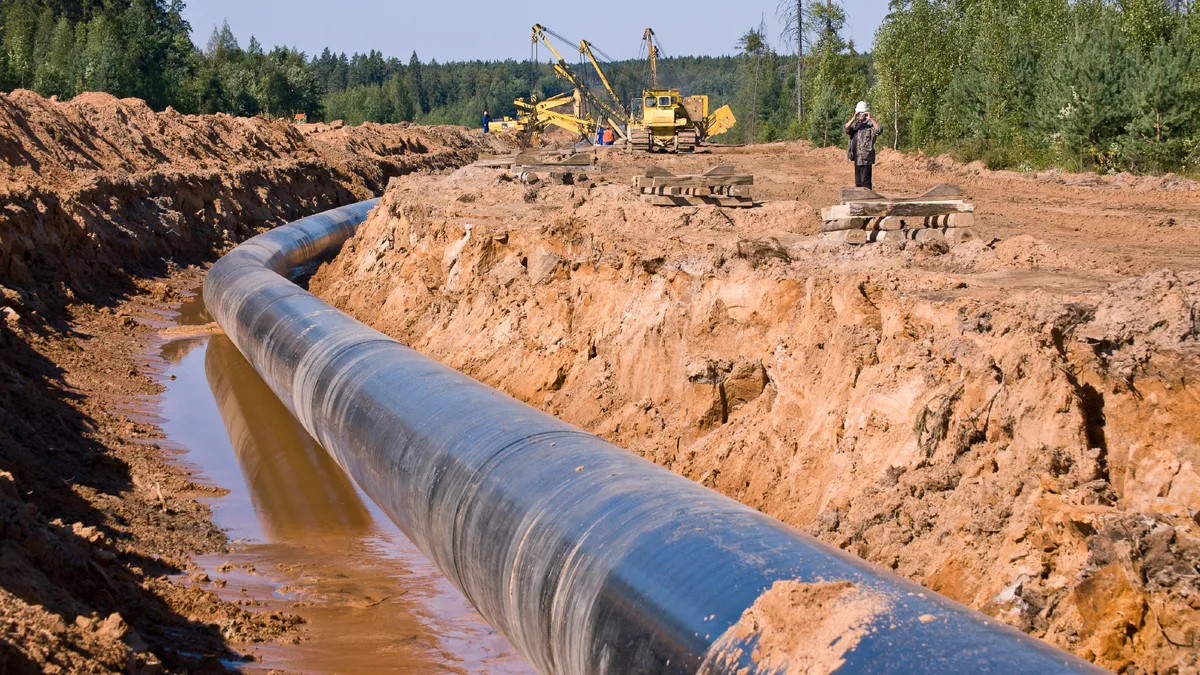UPDATE: July 8, 2021: This story has been updated to include Enbridge's comments, which were erroneously left out from its original publication, though an Enbridge spokesperson did respond to Construction Dive before deadline.
Enbridge tests workers on the first and seventh day of employment, then conducts bi-weekly tests after that, and requires wearing masks onsite, social distancing and daily temperature checks, spokesperson Juli Kellner told Construction Dive. The company said it is also encouraging workers to get vaccinated.
"We have incentivized immunization and are planning to bring vaccines to the construction sites through mobile clinics across the five construction work zones," Kellner said. The updated overall rate of positive test results during summer construction has been less than 0.6%, she said.
Dive Brief:
- As many as 788 workers have tested positive for COVID-19 on the $2.9 billion Enbridge Line 3 pipeline project in Minnesota since November, according to the data from the state's department of health shared with Construction Dive.
- The Minnesota Department of Health conducted an investigation to garner information about an increase in cases in Thief River Falls, Minnesota, that began in January. Health officials saw clusters of cases in multiple settings and had concerns about compliance with basic mitigation recommendations among community members.
- The department tried to mitigate the spread by increasing testing availability and opening vaccination clinics for the community. Of the 788 workers on Enbridge 3 who have tested positive, three were hospitalized and none died.
Dive Insight:
The Line 3 project is replacing a 1,097-mile-long crude oil pipeline that runs from Edmonton, Canada, to Superior, Wisconsin. Segments of the project in Wisconsin and North Dakota were completed prior to the 337 miles of work that is underway with the Line 3 replacement in Minnesota, which employed about 4,500 people during the winter surge in cases, according to Al Jazeera.
Calgary, Canada-based Enbridge began project work in northern Minnesota in December of 2020, shortly before a winter surge of COVID-19 cases began in the region. Environmental and community activists raised concerns that the project could heighten coronavirus risks in the communities along the pipeline route.
Despite the pushback, union leaders lauded the news, saying it would bring thousands of much-needed jobs to the region.
Employers in Minnesota are responsible for workplace contact tracing because they are the most equipped to identify workplace contacts through schedules, supervisor observations and video, the MDH statement said. Although Enbridge's safety office shared findings from its contact tracing, the health department said it could not pinpoint the source of most of the infections.
"With an infectious disease that spreads through close contact, ongoing community spread, and a large workforce coming and going that is made up of people from within Minnesota and from other states, there is no way to tease out the source of most infections," the statement said.
Many of the cases were from roommates and after-hours social contacts, the statement said.
"There are numerous factors at play, including Line 3 workers, other institutions, industries and occupations, community spread, etc.," it read.
While Enbridge did not respond to Construction Dive's request for comment, Enbridge Executive Vice President and President of Liquid Pipelines Vern Yu said in a press statement late last year that the company would implement a strict COVID-19 management plan. During the spike in cases, Enbridge increased surveillance testing of workers from biweekly to weekly, the MDH statement said.
On other recent energy projects, Enbridge has instituted COVID-19 testing and screening protocols for workers, including repeated testing and daily health and temperature screenings, as well as required practices like wearing masks, observing strict physical distancing and regularly sanitizing work areas.












